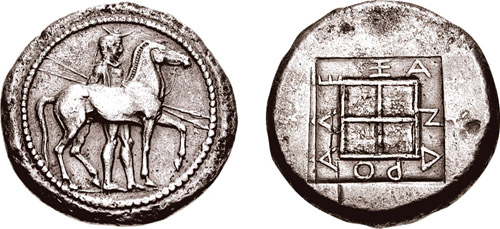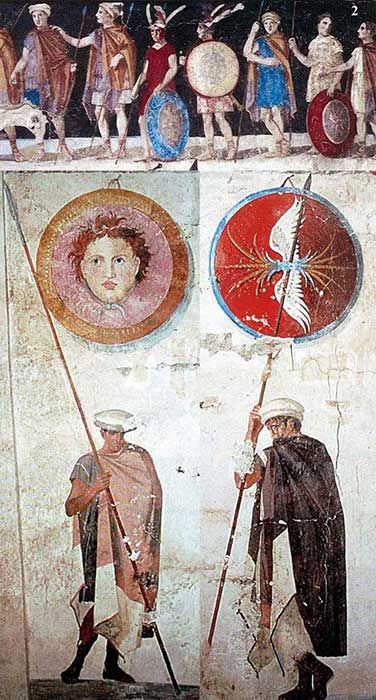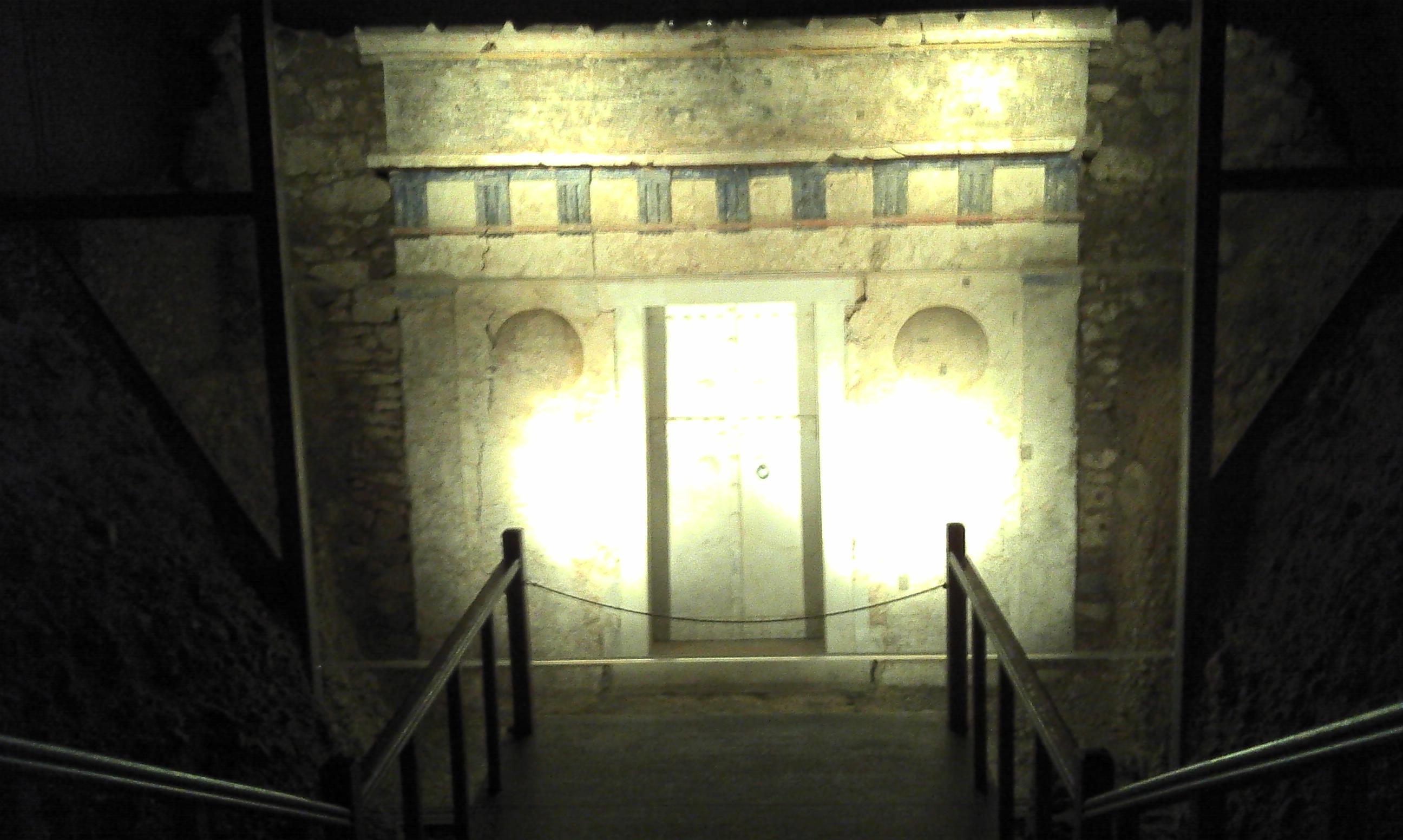|
Arrhidaeus
Arrhidaeus or Arrhidaios ( el, Ἀρριδαῖoς lived 4th century BC), one of Alexander the Great's generals, was entrusted by Ptolemy to bring Alexander's body to Egypt in 323 BC, contrary to the wishes of Perdiccas who wanted the body sent to Macedonia. On the murder of Perdiccas in Egypt in 321 BC, Arrhidaeus and Peithon were appointed temporary commanders in chief, but through the intrigues of the queen Eurydice they were obliged to resign soon afterwards their office at Triparadisus in Northern Syria. On the division of the provinces which was decided by those attending Triparadisus, Arrhidaeus obtained the Hellespontine Phrygia. In 319 BC, after the death of Antipater, Arrhidaeus made an unsuccessful attack upon Cyzicus; and Antigonus gladly seized this pretext to require him to resign his satrapy. Arrhidaeus, however, refused to resign and shut himself up in Cius. Notes References * Smith, William (editor); ''Dictionary of Greek and Roman Biography and Mythology ... [...More Info...] [...Related Items...] OR: [Wikipedia] [Google] [Baidu] |
Macedon
Macedonia (; grc-gre, Μακεδονία), also called Macedon (), was an ancient kingdom on the periphery of Archaic and Classical Greece, and later the dominant state of Hellenistic Greece. The kingdom was founded and initially ruled by the royal Argead dynasty, which was followed by the Antipatrid and Antigonid dynasties. Home to the ancient Macedonians, the earliest kingdom was centered on the northeastern part of the Greek peninsula,. and bordered by Epirus to the west, Paeonia to the north, Thrace to the east and Thessaly to the south. Before the 4th century BC, Macedonia was a small kingdom outside of the area dominated by the great city-states of Athens, Sparta and Thebes, and briefly subordinate to Achaemenid Persia. During the reign of the Argead king PhilipII (359–336 BC), Macedonia subdued mainland Greece and the Thracian Odrysian kingdom through conquest and diplomacy. With a reformed army containing phalanxes wielding the '' sarissa'' ... [...More Info...] [...Related Items...] OR: [Wikipedia] [Google] [Baidu] |
Macedonia (ancient Kingdom)
Macedonia (; grc-gre, Μακεδονία), also called Macedon (), was an Classical antiquity, ancient monarchy, kingdom on the periphery of Archaic Greece, Archaic and Classical Greece, and later the dominant state of Hellenistic Greece. The History of Macedonia (ancient kingdom), kingdom was founded and initially ruled by the royal Argead dynasty, which was followed by the Antipatrid dynasty, Antipatrid and Antigonid dynasty, Antigonid dynasties. Home to the ancient Macedonians, the earliest kingdom was centered on the northeastern part of the Greek peninsula,. and bordered by Epirus (ancient state), Epirus to the west, Paeonia (kingdom), Paeonia to the north, Thrace to the east and Ancient Thessaly, Thessaly to the south. Before the 4th century BC, Macedonia was a small kingdom outside of the area dominated by the great city-states of Athens, Sparta and Thebes, Greece, Thebes, and Achaemenid Macedonia, briefly subordinate to Achaemenid Persia. During the reign of the Argea ... [...More Info...] [...Related Items...] OR: [Wikipedia] [Google] [Baidu] |
Wars Of The Diadochi
The Wars of the Diadochi ( grc, Πόλεμοι τῶν Διαδόχων, '), or Wars of Alexander's Successors, were a series of conflicts that were fought between the generals of Alexander the Great, known as the Diadochi, over who would rule his empire following his death. The fighting occurred between 322 and 281 BC. Background Alexander the Great died on June 10, 323 BC, leaving behind an empire that stretched from Macedon and the rest of Greece in Europe to the Indus valley in South Asia. The empire had no clear successor, with the Argead family, at this point, consisting of Alexander's mentally disabled half-brother, Arrhidaeus; his unborn son Alexander IV; his reputed illegitimate son Heracles; his mother Olympias; his sister Cleopatra; and his half-sisters Thessalonike and Cynane. Alexander's death was the catalyst for the disagreements that ensued between his former generals resulting in a succession crisis. Two main factions formed after the death of Alexa ... [...More Info...] [...Related Items...] OR: [Wikipedia] [Google] [Baidu] |
Alexander The Great
Alexander III of Macedon ( grc, Ἀλέξανδρος, Alexandros; 20/21 July 356 BC – 10/11 June 323 BC), commonly known as Alexander the Great, was a king of the ancient Greek kingdom of Macedon. He succeeded his father Philip II to the throne in 336 BC at the age of 20, and spent most of his ruling years conducting a lengthy military campaign throughout Western Asia and Egypt. By the age of thirty, he had created one of the largest empires in history, stretching from Greece to northwestern India. He was undefeated in battle and is widely considered to be one of history's greatest and most successful military commanders. Until the age of 16, Alexander was tutored by Aristotle. In 335 BC, shortly after his assumption of kingship over Macedon, he campaigned in the Balkans and reasserted control over Thrace and Illyria before marching on the city of Thebes, which was subsequently destroyed in battle. Alexander then led the League of Corinth, and used his auth ... [...More Info...] [...Related Items...] OR: [Wikipedia] [Google] [Baidu] |
Perdiccas
Perdiccas ( el, Περδίκκας, ''Perdikkas''; 355 BC – 321/320 BC) was a general of Alexander the Great. He took part in the Macedonian campaign against the Achaemenid Empire, and, following Alexander's death in 323 BC, rose to become supreme commander of the imperial army, as well as regent for Alexander's half brother and intellectually disabled successor, Philip Arridaeus (Philip III). He was the first of the Diadochi who fought for control over Alexander's empire. In his attempts to establish a power base and stay in control of the empire, he managed to make enemies of critical generals in the Macedonian army—including Antipater, Craterus and Antigonus—who decided to revolt against the regent. In response to this formidable coalition and a provocation from another general, Ptolemy, Perdiccas invaded Egypt, but his soldiers revolted and killed him when the invasion foundered. Family background According to Arrian, Perdiccas was the son of the Macedonian n ... [...More Info...] [...Related Items...] OR: [Wikipedia] [Google] [Baidu] |
Eurydice III Of Macedon
Eurydice ( Greek: Εὐρυδίκη ''Eurydike''; died 317 BC) was the Queen of Macedon, wife of Philip III, daughter of Amyntas IV, son of Perdiccas III, and Cynane, daughter of Philip II and his first wife Audata. Biography Early life Eurydice's birth name appears to have been Adea; the sources are silent on when it was changed to Eurydice. She was brought up by her mother Cynane, and seems to have been trained by her mother in masculine and martial exercises. She accompanied her mother on her daring expedition to Asia; and when Cynane was put to death by Alcetas, the discontent expressed by the troops, and the respect with which they looked on Eurydice as one of the surviving members of the royal house, induced the imperial regent, Perdiccas, not only to spare her life, but to give her in marriage to King Philip Arrhidaeus, Alexander the Great's half-brother and successor to the throne of Macedon, as had been Cynane's plan. Sources hint that this was an unequal marriage, bec ... [...More Info...] [...Related Items...] OR: [Wikipedia] [Google] [Baidu] |
Treaty Of Triparadisus
The Partition of Triparadisus was a power-sharing agreement passed at Triparadisus in 321 BC between the generals (''Diadochi'') of Alexander the Great, in which they named a new regent and arranged the repartition of the satrapies of Alexander's empire among themselves. It followed and modified the Partition of Babylon made in 323 BC upon Alexander's death. Following the death of Alexander, the rule of his empire was given to his half-brother Philip Arrhidaeus and Alexander's son Alexander IV. However, since Philip was mentally ill and Alexander IV born only after the death of his father, a regent was named in Perdiccas; in the meantime, the former generals of Alexander were named satraps of the various regions of his empire. Several satraps were eager to gain more power, and when Ptolemy I Soter, satrap of Egypt, rebelled with other generals, Perdiccas moved against the former but was killed by a mutiny in his camp. Ptolemy declined the regency and instead brought to the offic ... [...More Info...] [...Related Items...] OR: [Wikipedia] [Google] [Baidu] |
Peithon
Peithon or Pithon ( Greek: ''Πείθων'' or ''Πίθων'', 355 – 314 BC) was the son of Crateuas, a nobleman from Eordaia in western Macedonia. He was famous for being one of the bodyguards of Alexander the Great, becoming the later satrap of Media, and claiming to be one of the diadochi. Peithon was named one of the seven (later eight) Somatophylakes "bodyguards" of Alexander in 335 BC. After Alexander's death in 323 BC, Peithon was made the satrap of Media, the strategically important region that controlled all roads between east and west. The satrapy was too large for one man; Peithon would be very powerful, and could destabilize the entire empire. Therefore, he had to give up the northern part, which was given to Atropates; from then on the region was known as Media Atropatene. The soldiers who remained in the eastern part of Alexander's realm after his death grew agitated by their lengthy stay abroad, and began spontaneous revolts. The regent Perdiccas sen ... [...More Info...] [...Related Items...] OR: [Wikipedia] [Google] [Baidu] |
Ancient Macedonian Generals
This is a list of ancient Macedonians, an ancient Greek tribe inhabiting the northeastern part of the Greek peninsula. Mythology * Makednos Kings Military personnel High generals * Parmenion – Strategos of Philip and Alexander and commander of pharsalian squadron * Attalus strategos of Philip and early taxiarch of Alexander *Hephaestion – Chiliarch (after 327 BC) *Perdiccas – Chiliarch (after 324 BC) *Seleucus I Nicator – Chiliarch (after 323 BC) Somatophylakes *Aristonous of Pella *Arybbas (somatophylax) *Balacrus *Demetrius (somatophylax) *Hephaestion *Leonnatus *Lysimachus * Menes of Pella * Pausanias of Orestis Philip's *Peithon *Peucestas *Ptolemy (somatophylax) * Ptolemy (son of Seleucus) *Ptolemy I Soter Cavalry Hipparchoi * Philotas (after 330 BC, Cleitus the Black, Coenus, Hephaestion, Craterus, Perdiccas, Cleitus the White) leaders of Hetairoi (1800 horses) *Cleitus the Black, Royal cavalry * Sopolis, cavalry of Amphipolis * Heraclides (son of Antioc ... [...More Info...] [...Related Items...] OR: [Wikipedia] [Google] [Baidu] |
Alexander IV Of Macedon
Alexander IV (Greek: ; 323/322– 309 BC), sometimes erroneously called Aegus in modern times, was the son of Alexander the Great (Alexander III of Macedon) and Princess Roxana of Bactria. Birth Alexander IV was the son of Alexander the Great (a Macedonian Greek) and Alexander's wife Roxana (a Sogdian). He was the grandson of Philip II of Macedon. Because Roxana was pregnant when Alexander the Great died on 11 June 323 BC and the sex of the baby was unknown, there was dissension in the Macedonian army regarding the order of succession. While the infantry supported Alexander the Great's half-brother Philip III (who had some unknown cognitive disability present throughout his life), the chiliarch Perdiccas, commander of the elite Companion cavalry, persuaded them to wait in the hope that Roxana's child would be male. The factions compromised, deciding that Perdiccas would rule the Empire as regent while Philip would reign, but only as a figurehead with no real power. If ... [...More Info...] [...Related Items...] OR: [Wikipedia] [Google] [Baidu] |
Antipater
Antipater (; grc, , translit=Antipatros, lit=like the father; c. 400 BC319 BC) was a Macedonian general and statesman under the subsequent kingships of Philip II of Macedon and his son, Alexander the Great. In the wake of the collapse of the Argead house, his son Cassander would eventually come to rule Macedonia as a king in his own right. In 320 BC, Antipater was elected regent of all of Alexander the Great's Empire but died the following year. In a perplexing turn of events, he chose an infantry officer named Polyperchon as his successor instead of his son Cassander, and a two-year-long power struggle ( the Second War of the Diadochi) ensued. Career under Philip and Alexander Nothing is known of his early career until 342 BC, when he was appointed by Philip to govern Macedon as his regent while the former left for three years of hard and successful campaigning against Thracian and Scythian tribes, which extended Macedonian rule as far as the Hellespo ... [...More Info...] [...Related Items...] OR: [Wikipedia] [Google] [Baidu] |
William Smith (lexicographer)
Sir William Smith (20 May 1813 – 7 October 1893) was an English lexicographer. He became known for his advances in the teaching of Greek and Latin in schools. Early life Smith was born in Enfield in 1813 to Nonconformist parents. He attended the Madras House school of John Allen in Hackney. Originally destined for a theological career, he instead became articled to a solicitor. Meanwhile, he taught himself classics in his spare time, and when he entered University College London carried off both the Greek and Latin prizes. He was entered at Gray's Inn in 1830, but gave up his legal studies for a post at University College School and began to write on classical subjects. Lexicography Smith next turned his attention to lexicography. His first attempt was ''A Dictionary of Greek and Roman Antiquities'', which appeared in 1842, the greater part being written by him. Then followed the ''Dictionary of Greek and Roman Biography and Mythology'' in 1849. A parallel '' Dictionar ... [...More Info...] [...Related Items...] OR: [Wikipedia] [Google] [Baidu] |






